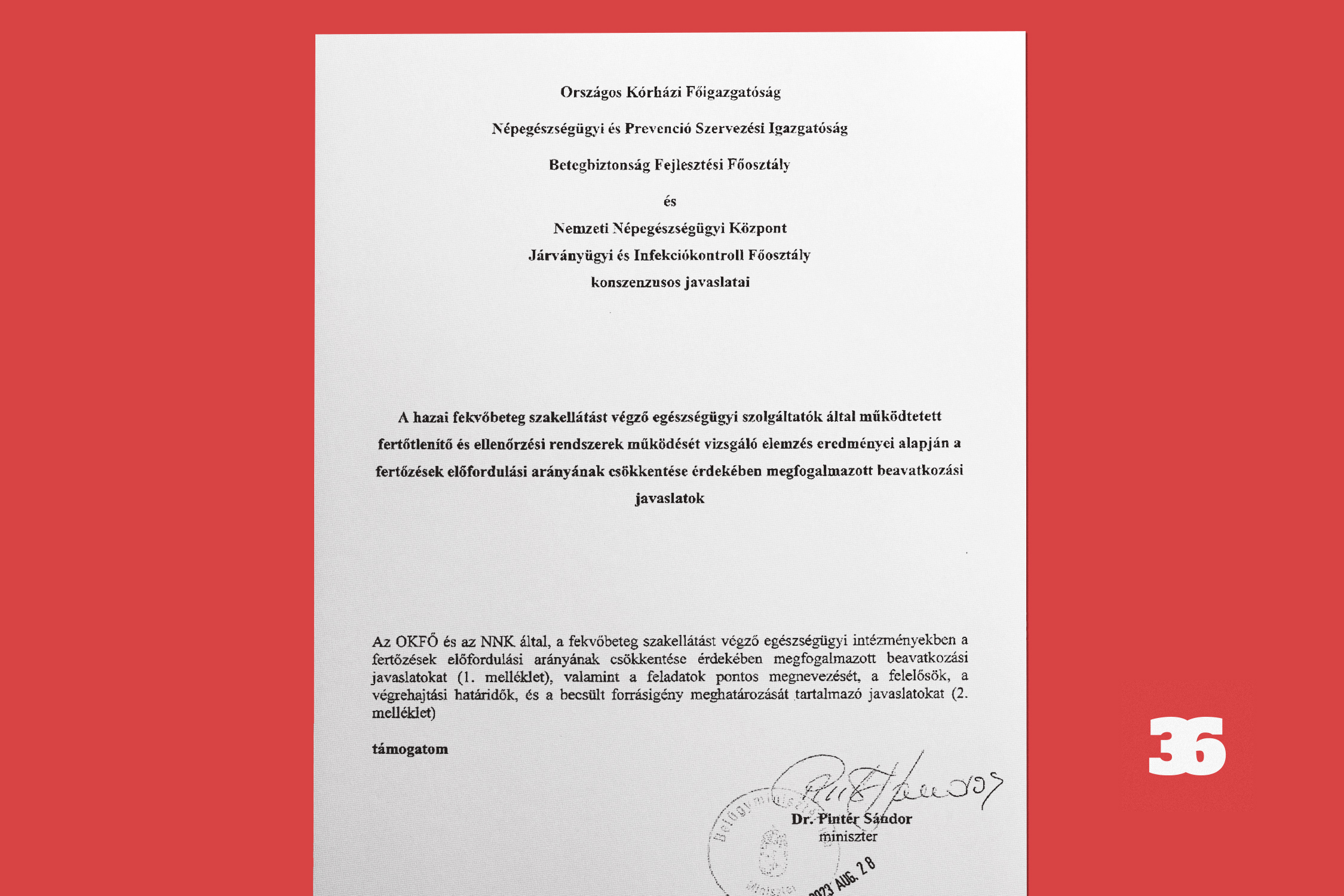The Ministry of Interior says there is no problem with hospital-acquired infections. However, a leaked document says they know the situation is serious

After Direkt36 published a series of articles and a documentary in the past few weeks on the worsening situation of hospital-acquired infections in Hungary, the government repeatedly made statements denying the problem. For example, state secretaries of the Ministry of the Interior, which is responsible for public health, claimed that Hungary is actually doing well in this area by European standards.
In fact, however, the Ministry of the Interior is well aware that there is a serious problem.
Direkt36 has obtained a document, leaked from the Ministry of Interior, stating that
the occurence of healthcare-associated infections is rising and “indicates an unfavorable tendency”, and that there is a “human resource crisis” in the healthcare system.
The document, compiled by the National Directorate General for Hospitals (NDGH) and the National Center for Public Health and Pharmacy (NCPHP), contains a situation report and proposals for action to tackle the problem. These plans are known and supported by Minister of the Interior Sándor Pintér, who signed the document on August 28, 2023.
This document acknowledges that health authorities have not yet examined the prevalence of infections in hospitals nationwide. “National monitoring of the data is not resolved. Such a national database would provide an objective picture of the institutional and national level of infection control,” the document writes, adding that annual self-assessments at institutional level would help identify areas for improvement and track progress.
In Hungary, Direkt36 was the first to analyze how hospitals are performing nationally in terms of infection rates. It was revealed that some hospitals are particularly worse compared to the majority for several types of infection.
”Even if the statistics get worse”
The leaked document lists among the most important measures health care decision-makers should support the infection control program, and that professionals should collect and analyze data on antibiotic consumption. The report also highlights the need to increase the number of microbiological samples taken to detect hospital-acquired infections. As we reported in a previous article, the NCPHP also admitted to Direkt36 that they are aware that hospitals are taking too few samples, which affects the numbers of officially reported hospital-acquired infections.
The document says that the number of tests should be increased even if it results in a more alarming picture.
“It is in the interest of patients to have as many samples taken as possible, even if this increases the number of infections in large numbers and thus worsens national statistics,”
the document says.
Help us tell the truth in Hungary, become a supporter!
It also stresses the importance of overcoming the shortage of qualified health care professionals, strengthening education on infection control and antibiotic use, and monitoring the knowledge acquired. The document adds that education, regular training and monitoring of cleaners are essential to improve the quality of cleaning in hospitals
Planning cheap solutions
In the introduction of the tasks section of the interior ministry document, it is stated that they do not intend to spend a lot of money on solving the problems for now. They will concentrate primarily on those tasks that can be done in the short term and without major expense, and
which take into account the healthcare system’s current capacities, such as the “human resources crisis” or isolation problems due to the lack of single-bed hospital rooms.
For example, guidelines on infection prevention would be updated. The NCPHP confirmed to RTL’s evening news that they are currently working on “updating the methodological guidelines on good practice in disinfection”. More attention would be paid to measuring patient satisfaction and monitoring the hand hygiene activities of hospital staff. A new reporting system and database to monitor the responsible use of antibiotics would be set up to help reduce multiresistant pathogen-type hospital-acquired infections. These tasks would only cost a total of ITT ELŐSZÖR EURÓBAN SZEREPELJEN (HUF 60 million) for now, according to NCPHP and NDGH calculations.
Direkt36 asked the Ministry of Interior if there are plans to launch longer-term or better-funded programs, but we did not receive a reply.
Last month, as part of Direkt36’s Semmelweis Project investigation, we published a series of articles – and a documentary – on the situation of hospital-acquired infections in Hungary. We have shown how authorities try to hide infection data and revealed that, in reality, there may be even much more hospital-acquired infections than hospitals admit. In the second part of the Semmelweis Project, we published a ranking of hospitals by the occurence of hospital-acquired infections and made available our analysis and the data we worked from.
Based on background interviews with hospital cleaners, nurses, doctors and infectologists, we also showed how hospital conditions play a key role in the spread of infections. In the fourth part of our series, we showed international examples of how hospital-acquired infections have been reduced elsewhere, and how transparency, data collection and feedback are important for hospitals to control the spread of infections.
Misleading statements
After the publication of our articles, Péter Takács, Secretary of State for Health of the Ministry of Interior gave several interviews on the issue of hospital-acquired infections but did not acknowledge the severeness of the problem we had identified. For example, in an interview with pro-Orbán news channel Hír TV on November 8, he said that, according to data from the European Center for Disease Prevention and Control (ECDC), Hungary performs better than the EU average in the treatment of hospital-acquired infections. He added that data on hospital-acquired infections broken down by institutions are already available on NCPHP’s website.
Help us tell the truth in Hungary, become a supporter!
However, NCPHP’s annual reports, to which Takács is presumably referring, only include regional data and do not show individual performance of hospitals.
The European comparison he cites is misleading because so few laboratory tests are carried out in Hungary that a significant portion of hospital-acquired infections are likely to remain hidden.
Bence Rétvári, Deputy Minister of the Ministry of Interior, has also reacted several times to Direkt36’s series of articles when asked about opposition MPs in parliament. Rétvári too cited ECDC data to claim that Hungary is doing well in preventing hospital-acquired infections.
Direkt36 asked the interior ministry why its state secretaries were denying the severeness of the problem in public when the leaked document clearly proves that they are fully aware of the real situation within the ministry. The ministry did not react.
Action is needed, according to the minister
There are additional signs that the leadership of the Ministry of Interior is aware how serious the hospital-acquired infections situation is.
In July 2023, representatives of the Hungarian Medical Chamber (MOK) met in person with Sándor Pintér, Péter Takács and other representatives of the Ministry of Interior. The issue of infections was also discussed at this meeting.
Infectologist András Csilek told Direkt36 that, according to an internal memo on the meeting,
Pintér himself acknowledged that the number of infections had risen after the coronavirus epidemic and that he intended to do something about it.
“Action needs to be taken in this area, he is waiting for the MOK’s input,” the meeting transcript reads.
On August 31, MOK eventually sent Pintér their recommendations on reducing hospital-acquired infections, which they also posted on their website. They identified 20 key points, including improving the infrastructure needed to prevent infections, increasing the number of nursing staff, and providing a transparent presentation of hospital-acquired infections by hospitals, which they said should be published regularly and publicly, with a clear professional review.
The Ministry of Interior did not respond to our question on what they plan to do with these proposals.
To follow further articles in this series, sign up to receive alerts on our investigations.
Cover photo by Péter Somogyi (szarvas) / Telex


